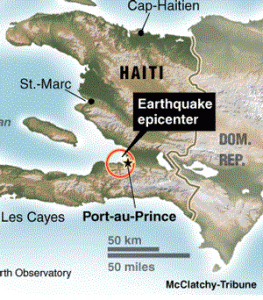 The past four decades has seen significant leaps in cancer survival rates…in the United States. However, what are the cancer diagnoses and survival chances for someone born in a developing country? Dr. Mark Agulnik, an assistant professor in Medicine-Hematology/Oncology at Northwestern University’s Feinberg School of Medicine recently talked about the cancer patients he saw while working in Haiti after a devastating earthquake hit the country in January 2010.
The past four decades has seen significant leaps in cancer survival rates…in the United States. However, what are the cancer diagnoses and survival chances for someone born in a developing country? Dr. Mark Agulnik, an assistant professor in Medicine-Hematology/Oncology at Northwestern University’s Feinberg School of Medicine recently talked about the cancer patients he saw while working in Haiti after a devastating earthquake hit the country in January 2010.
Even before the earthquake, people on Haiti had different economic and medical challenges than those in the US. While it shares an island with the Dominican Republic, a relatively stable and prosperous country, the Haitian side of the island has been deforested and has little industry to maintain the economy. The Human Development Index designates it as the poorest country in the Americas where half of the population is illiterate and life expectancy is 53 years old, more than 20 years shorter than in the United States. When the 7.0 magnitude earthquake hit, it killed 316,000 people and instantaneously made 1.5 million people homeless. When Dr. Agulnik first visited the country in the weeks after the quake, there was no commerce, tent villages housed the homeless, and a cholera epidemic was emerging due to a lack of sanitation.
Less than 1 year after the quake, medical care has improved and specialized cholera hospitals are limiting the spread of outbreaks. Dr. Agulnik, who most recently visited the country in December of 2010, described how he used his expertise as a hematologist and oncologist, who specializes in blood diseases and cancers, to treat Haitian people. He discussed a variety of patients who came into his small hospital in Port-au-Prince with advanced neck, gynecological, and thoracic cancers. In contrast to treatment within the United States, the team in Haiti worked to decrease the symptoms of these patients and ease their suffering but they did not have the tools and drugs to cure the cancers.
In addition to lacking the resources to treat these advanced cancers, many developing countries, such as Haiti, have not established screening programs that could catch cancers early and increase survival rates. Such programs are the next front in cancer care as, “More people die from cancer in the developing world than tuberculosis, HIV, and malaria,” stated Agulnik. Fortunately, organizations such as Project Medishare, the American Red Cross, and ASCO International Cancer Corps work to provide medicine and medical education in resource-limited settings. With this effort, cancer survival rates will increase in developing nations, making survivorship issues more important for these populations. Work at the Oncofertility Consortium examines the potential oncofertility needs, such as fertility preservation, of cancer patients in developing countries.

